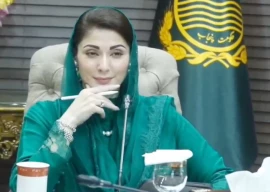1715688467-0/Capture-(5)1715688467-0.jpg)
The government on Tuesday pushed back against the claims in a new leak taking round on the social media, forcing the Attorney General for Pakistan Mansoor Awan, Law Minister Azam Nazeer Tarar and Information Minister Attaullah Tarar to offer explanatory statements on Tuesday.
In their separate statements, the AGP and the ministers clarified that the perception created by the letter, purportedly written by IHC Justice Babar Sattar, was contrary to the facts. They rejected the idea of any interference in the judicial matters.
Also on Tuesday, the IHC issued notices to the heads of several intelligence agencies and regulatory bodies over the leaking of travel documents and other confidential information about Justice Babar Sattar's family and a malicious campaign against the judge on the social media.
Earlier, on Tuesday, a snippet from a leaked letter, which circulated on social media, stated that the current malicious campaign’s focus on cases involving regulatory bodies appeared to be an “intimidatory tactic” to influence court proceedings.
The letter said that in the audio leaks case, the IHC had put on notice the heads of state intelligence agencies and institutions, ministries and media regulators, adding that “the question before the court is whether there exists a legal regime permitting surveillance of citizens”.
“At some point during the hearing of the case, I was delivered messages on behalf of top officials in the security establishment asking me to ‘back off’ from extensive scrutiny of the existence and mode of surveillance. I paid no heed to such intimidatory tactics and did not find that such messages created a risk of substantial detriment to the administration of justice,” the snippet said.
Weighing in into the matter, former president Dr Arif Alvi, commented: “Very important new written comment by Justice Babar Sattar. It is evident to all except those who choose to ignore, that judges have been under tremendous pressure.”
AGP Awan, in his statement, refrained from directly mentioning Justice Babar Sattar. He stated that the contents of the letter, addressed from an IHC judge to IHC Chief Justice Aamer Farooq, had surfaced, portraying it as an “internal communication” of the court.
“The contents of that letter are being reported in such a way and the impression is being given as if there is interference in the IHC and that a message was sent to that judge regarding a specific case…” the AGP said, stressing the need for clarifying the matter.
He pointed out that the judge himself indicated in the leaked excerpt that he did not feel intimidated by the message, however, he viewed it as an infringement on the principles of justice. He further said that the judge’s reference in the letter was to the social media campaign against him.
“But because this is a matter that is now out in the media, I, as the AGP, felt it necessary to explain the matter because a perception is being created that there is some breakdown in relations between the judiciary and the executive because of which the issue is moving forward,” Awan said.
The AGP stressed that there were “sensitive matters” of the state where communication between different institutions was necessary, adding that it was the AGP’s office or the provincial advocate generals, who facilitated such communication.
“A communication certainly happened but what unfortunately occurred was that the impression was somehow sent or understood as if the case should be taken in a particular direction. There was absolutely nothing of this sort.” He emphasised that neither the government nor any other state institution could meddle in judicial matters.
Later in the day, Azam Nazeer Tarar and Attaullah Tarar convened a press conference to address the concerns raised by the letter. “What I’m pained by is the interpretation of this matter in such a way that the impression was created as if there is interference in the judiciary,” Azam said.
Echoing the AGP’s assertion regarding the need for in-camera briefings on surveillance capabilities, Azam endorsed Awan’s position. “This is a law all over the world and over here too and it should be as well,” the law minister told the reporters.
Read: Six IHC judges seek SJC’s action over spy agencies interference
“This is the reason why when you communicate through law officers or the officers of the AGP or advocate generals, then it is traditionally a better course for such requests to keep some matters in-camera,” the minister added.
Attaullah stressed the importance of national security, stating, “If a message by the AGP, who is the state representative, is sent to have an in-camera briefing then writing a letter on it saying: ‘I’ve been told to back off,’ after misconstruing it and taking it out of context is not at all rooted in reality.”
The information minister emphasised the importance of proper channels for addressing concerns, stating, “To write a letter to the chief justice of the same court with whom you have daily meetings is I think akin to making the issue controversial.”
Meanwhile, an IHC larger bench, comprising Justice Mohsin Akhtar Kayani, Justice Tariq Mehmood Jahangiri and Justice Sardar Ejaz Ishaq Khan heard the contempt of court case, being initiated in the context of Justice Babar Sattar's letter of April 27 about the social media campaign against him.
The notices were issued to the defence secretary and heads of the Inter-Services Intelligence (ISI), Intelligence Bureau (IB), Military Intelligence (MI), Informational Technology (IT) Department or 5G Warfare Wings of the Counter-Terrorism Department (CTD) and the Federal Investigation Agency (FIA).
Besides, notices were also issued to the chairmen of the Pakistan Electronic Media Regulatory Authority (Pemra), Pakistan Telecommunication Authority (PTA), Federal Board of Revenue (FBR), Immigration and Passports director general, office of the attorney general for Pakistan (AGP) and the advocate general.
Justice Kayani remarked that it was worrying that the confidential information of the judge, to which no-one else had the access, had been leaked, the data was uploaded from some Twitter accounts and a malicious campaign was launched.
He noted that it could be possible that state agencies might have leaked that information or their systems could have been hacked. Either way it was not difficult to find. The judge warned that if anyone tried to approach judge, contempt of court proceedings would be taken up to the high office.
The judge noted that the role of ISI, IB, PTA had to be examined. It could not happen that everything was done on social media or the print and electronic media. Continuing, he added that it was easy to say that a fifth generation warfare was going on but asked “only judges will be the victims of this warfare.”
The judge stated that notice would be issued to all the institutions and a report would be sought so no one dare approach judge. The judge also raised questions about the Pakistan Lawyers Forum and from where this account was being operated.
In a three-page written order, the court said that Justice Babar Sattar wrote a letter about a malicious campaign against him on the social media. Apparently, it added, a systematic campaign was launched against Justice Babar Sattar and an attempt was made to defame Justice Babar Sattar.
The order stated that the court directed the Cyber Crime Wing, ISI, IB, MI, CTD, PTA to investigate the hashtags and the accounts from which the campaign was started and find out the identity and names of the participants in those hashtags, and submit reports.
The court also sought report about the top five accounts which tweeted the most regarding the campaign. It also sought information about the relevant Twitter handles, account names, tweets, text, replies and retweeters. The FBR was asked to explain how the asset details of a judge’s family were leaked.
The order said that Pemra should give a report related to the content and the petition on the channels and asked the Immigration DG and the FIA to explain how the third party got access to the confidential information of Justice Babar Sattar's family.
The hearing was adjourned till May 23.


1725784957-0/Tribune-Pic-(17)1725784957-0-165x106.webp)
1724760612-0/Untitled-design-(12)1724760612-0-165x106.webp)














COMMENTS (2)
Comments are moderated and generally will be posted if they are on-topic and not abusive.
For more information, please see our Comments FAQ